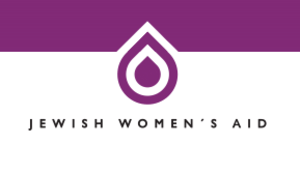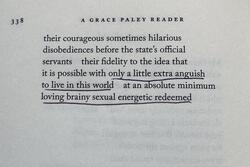The Other JWA
Logo for the Jewish Women's Aid.
JWA made a startling discovery recently: we have a doppelgänger. Okay, that’s not quite accurate. Perhaps it would be better to say that our URL, jwa.org, has a near-doppelgänger: jwa.org.uk. Who was this mysterious British JWA, we wondered? We soon found out that the British JWA stands for Jewish Women’s Aid. It’s an organization that supports Jewish women affected by domestic violence. We sat down to talk with chief executive Naomi Dickson about the insidious nature of domestic violence in the Jewish community and the work her organization does to combat that.
What's the history of your organization?
In the 1980s, a group of Jewish social workers in Leeds and London both decided they needed an organization for Jewish women affected by domestic violence. They started thinking separately, then put their heads together.
The first service we set up was a helpline––it's still running. There are sixty volunteers who respond to calls and refer women to our client support team. That team manages people's safety, makes sure that women are not at risk, helps them access welfare benefits, and finds refuge space if they need it. We have people pinging us daily; they know something isn’t right but they struggle to fully articulate that. They may start out by saying things like, "My marriage isn’t what I think it should be, my husband isn't very kind to me," but more often than not, when we delve down into it and interview them, we find there's actually been sustained abuse for years.
Why is it specifically important to have a domestic violence organization for Jewish women?
You can imagine in the Jewish community, which is very family-focused, it's hard to make that phone call. They think they're not going to be believed, especially if their husband is a strong member of the community. They think, what will my mum say? What will my grandma say? We found that women in the wider community get abused 35 times before they seek help, but I'm certain that Jewish women stay longer.
But that's why we're important. The main thing we say is, “We believe you.” Then we help them: whether that means helping them stay in the relationship until they're ready to leave it, or helping them leave right away.
People often ask that––my answer is always that when somebody's at a very low point in their life, the cultural and religious understanding we can give them is important. They don't need to say, I need to stay in this area because my children need to stay in a Jewish school. They don't need to say, Pesach is a hard time for me because food is expensive. We understand that already. And we understand that confidentiality needs to stay more than watertight, because everyone knows everyone else, given that there are only 250,000 Jews in the UK. We always ask, when interviewing people for a job here, what are you going to do when your friend walks in here in two weeks? They say it won’t happen, but it always does. It's a small community.
There's also a perception in the community that domestic abuse doesn't happen to Jewish women, or to Jewish children. That these nasties don't happen among the Jewish people. But that's just not true. I had a woman say to me, you wouldn't wish it on any other Jewish woman, but it's a comfort to know that you're not alone.
Can you talk about the outreach that you do within the Jewish community?
We go into Jewish secondary schools to talk about healthy relationships. We run a program called Safer Dating, for 16- to 25-year-old Jewish people, talking about sexual harassment on campus, revenge porn, all the really unpleasant things that are happening on campuses around the country at the moment. If young people are leaving home and going to campus and having their first relationship, they need support and to support their friends if something goes wrong. We also offer support for professionals, colleagues, emergency service personnel, therapists, medical professionals. We give them the skills to think, I'm working with this woman, why is she talking in this way? Might it be domestic abuse? What should I do next?
When you navigate to your website, a box pops up that advises visitors that they can hide the website quickly. Why is that important?
We've had this website for about six years. At the point we set it up, we did research into other domestic violence service websites, and they all have that warning. Interestingly, it serves two functions: the main one is for a woman to jump off the website quickly if she's worried her perpetrator might be able to see what she's looking at. But another purpose is that funders will look at the website and say, wow, this really brings home to me how scary it must be to live with an abuser. It brings home the danger.
What should you do if you think someone you know is involved in a domestic abuse situation? Or if you are caught in such a situation?
Try to find an organization. Have an initial conversation about what's been going on. It's very, very scary. The hardest thing is talking about it for the first time: naming it as abuse. Taking the first step on a journey where you don't know where you'll end up. If you don't feel comfortable making a phone call on your own, do it with a friend.
If you're a friend of a person who's being abused, the initial conversation is quite hard to have. Make sure you're in a coffee shop or somewhere you can have a quiet, private conversation. Say something like, are you safe? Are your children safe? I've seen some troubling things. How about we go together and get advice?
It's not our job to tell women what to do. Our job is to tell women their options. In abuse, a lot of times women's agency has been taken away from them, and part of the rehab process we provide is giving that back to them.







